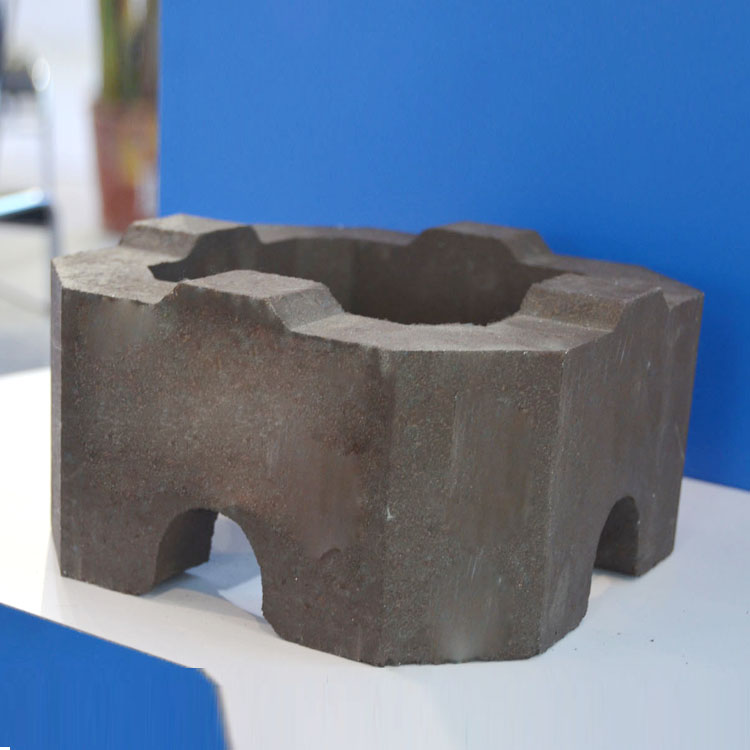
In the high - temperature industrial landscape, electro - fused magnesia bricks stand out as a crucial component. Their significance lies in the ability to provide reliable support and protection in harsh high - temperature environments. Let's take a closer look at the unique properties of these bricks and their wide - ranging applications.
Electro - fused magnesia bricks are primarily made from fused magnesia, which endows them with several outstanding properties. Firstly, they have excellent resistance to alkaline slag. Alkaline slag is a common by - product in many high - temperature industrial processes, and it can corrode ordinary refractory materials. However, electro - fused magnesia bricks can withstand the attack of alkaline slag. Studies have shown that in a laboratory environment with a high - alkaline slag concentration, the corrosion rate of electro - fused magnesia bricks is only about 10% - 15% of that of some ordinary refractory bricks over a certain period.
Secondly, these bricks possess a high refractoriness. The melting point of electro - fused magnesia bricks can reach up to 2800°C, which means they can maintain their structural integrity even in extremely high - temperature environments. This high refractoriness makes them suitable for use in industries where high - temperature stability is crucial.
In addition, electro - fused magnesia bricks have good thermal stability. They can resist rapid temperature changes without cracking or spalling. For example, in a thermal cycling test from room temperature to 1500°C and back, electro - fused magnesia bricks showed no significant damage after 50 cycles, while some other refractory materials started to show visible cracks after only 20 cycles.
Electro - fused magnesia bricks have a wide range of applications in high - temperature industries. In the steel industry, they are used in the lining of electric arc furnaces. The high refractoriness and resistance to alkaline slag of electro - fused magnesia bricks can effectively protect the furnace lining from the high - temperature molten steel and slag, extending the service life of the furnace. For instance, a steel plant in the United States replaced the original refractory lining with electro - fused magnesia bricks in its electric arc furnace. As a result, the furnace lining's service life increased from about 300 heats to more than 500 heats, significantly reducing the maintenance cost and improving production efficiency.
In the cement industry, electro - fused magnesia bricks are used in the rotary kiln. The high - temperature environment in the rotary kiln requires refractory materials with excellent thermal stability and resistance to chemical corrosion. Electro - fused magnesia bricks can meet these requirements, ensuring the smooth operation of the cement production process.
When compared with other refractory materials, electro - fused magnesia bricks have obvious advantages. For example, compared with clay bricks, electro - fused magnesia bricks have a much higher refractoriness and better resistance to alkaline slag. Clay bricks may start to soften at around 1500°C, while electro - fused magnesia bricks can still maintain their shape and performance at temperatures above 2000°C. In terms of cost - effectiveness, although the initial investment in electro - fused magnesia bricks may be slightly higher, their long service life and low maintenance requirements make them a more economical choice in the long run.
A research institution conducted a comprehensive performance test on electro - fused magnesia bricks and several other common refractory materials. The test results showed that in terms of thermal conductivity, electro - fused magnesia bricks were 20% - 30% lower than some traditional refractory materials, which means they can save more energy in high - temperature applications. In a real - world case, a glass manufacturing company replaced its old refractory lining with electro - fused magnesia bricks. After the replacement, the energy consumption of the melting furnace decreased by about 15%, and the product quality also improved significantly.
In summary, electro - fused magnesia bricks are a reliable and efficient choice for high - temperature industries. Their unique properties, such as resistance to alkaline slag, high refractoriness, and good thermal stability, make them ideal for various high - temperature applications. Through real - world cases and data, we can clearly see their value in improving production efficiency, reducing costs, and ensuring product quality. We sincerely recommend that you choose electro - fused magnesia bricks as a reliable refractory material for your enterprise's high - temperature production. They will provide a solid guarantee for your production and help you achieve safe production and sustainable development.

.jpg)
.jpg)


